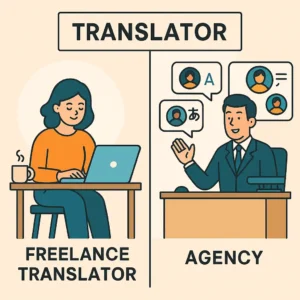Xinyuan | May 5, 2025
Hiring the right translator or language professional can make or break your project. Freelancers bring direct communication, lower costs, and niche expertise, while agencies offer scalable services, multi-step quality control, and full project management. The smartest choice depends on your budget, timeline, and project scope.
In this guide, we compare freelance translators and agencies across 10 key areas—availability, quality, pricing, scalability, and more—so you can make a confident decision.
5 Challenges of Chinese Translators When Working on Projects

1. Core Difference Between a Freelance Translator and an Agency
Freelancers usually focus on one or two language pairs and work independently. Agencies, on the other hand, manage teams of linguists and project managers, making them better suited for large, multilingual projects.
2. Translator Costs & Pricing Models Compared
Freelancers often charge less because they cover just the translation itself. Agencies may seem more expensive, but their fees usually include editing, proofreading, terminology management, and project oversight.
3. Translator Communication vs. Agency Communication
One advantage of hiring a freelancer is direct communication—messages go straight to the person doing the work. Agencies rely on structured communication through project managers, which may feel less personal but ensures accountability and clearer tracking for complex projects.
4. Quality Assurance: Translator Work vs. Agency Processes
A freelance [translator → linguist] may proofread their own work, while agencies typically use multi-step QA workflows with multiple linguists checking each project. Many agencies also align with international standards like ISO 17100 Translation Services, which defines requirements for quality and consistency.
5. Project Scalability Beyond a Single Translator
Freelancers deliver excellent results on smaller jobs. For larger, multi-market projects, agencies can divide work among teams of specialists, manage translation memory, and coordinate formatting.
6. Subject Expertise: Finding the Right Translator vs. Agency Team
Many freelance [translators → experts] specialize in one or two areas such as law, medicine, or marketing. Agencies build networks of specialized linguists, assigning the best-suited expert to each document type.
7. Flexibility: When a Translator Outshines an Agency
Freelancers are often more agile, able to start quickly and adapt to special requests. Agencies rely on standardized workflows, which may be less flexible but provide reliable structure.
8. Turnaround Time: Translator Speed vs. Agency Resources
A freelancer may deliver small projects faster, but agencies can coordinate multiple linguists across time zones—making them unbeatable for urgent, multilingual assignments.
9. Confidentiality and Data Security with Translators vs. Agencies
10. Long-Term Fit: Translator Relationships vs. Agency Partnerships
Freelancers build strong one-on-one relationships with clients. Agencies, meanwhile, offer long-term scalability—handling multiple projects, formats, and languages while maintaining unified quality standards.
Feature Comparison Table
Feature Freelancer ✅ Agency ✅
Lower Cost ✅
Direct Communication ✅
Niche Expertise ✅
Multilingual Capability ✅
Scalability ✅
Built-in QA ✅
Project Management ✅
Brand Voice Consistency ✅
Security Compliance ✅
Best for Urgent/High Volume ✅
Real-World Example
A marketing manager at a fintech startup first hired a freelance translator for a white paper. The freelancer delivered accurate, niche-specific work at a fair price. Later, when the company needed 8 landing pages and 3 investor decks translated into five languages within two weeks, they turned to an agency for scalability.
Lesson: Different stages of growth may require different types of translation providers.
Chinese Translators: How We Select High-Quality Talent at AZ-Loc
At AZ-Loc, we carefully vet every Chinese translator we work with. Selection goes beyond language proficiency—we evaluate subject-matter expertise, industry experience, writing ability, and cultural fluency. For example:
- Legal translators are tested with bilingual contracts to ensure they catch every clause.
- Marketing linguists undergo trial projects where tone and creativity are evaluated.
- Technical experts are checked for their ability to use CAT tools and handle complex file formats.
This rigorous process ensures that every translator we assign is not only skilled in Chinese and English but also equipped to meet your industry’s unique requirements.
Chinese Translators: How We Select High-Quality Talent at AZ-Loc
👉 Looking for reliable Chinese translators who meet the highest standards? Contact AZ-Loc today to discuss your project and get a customized solution from our vetted team of experts.
